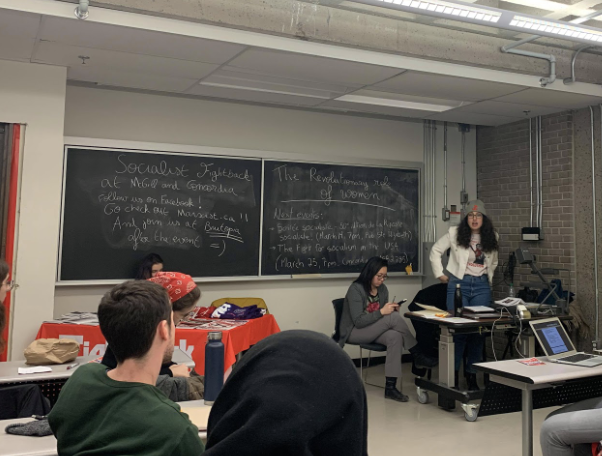Socialist Fightback at Concordia and McGill and Socialist Fightback Students held a meeting on March 12 in the Leacock building to commemorate International Women’s Week. Speakers discussed the role of working-class women in sparking mass protests and revolutionary movements in countries around the world. Attendees stressed the ongoing struggles that women face in society and in the workplace, highlighting what they perceive as a major limitation of the capitalist system.
In her 40-minute opening presentation, Socialist Fightback organizer Sarah Farah dispelled the common myth that socialist revolutions are a masculinist enterprise. She explained why, historically, women are usually on the front lines of revolutions.
“We see this recurring pattern that women tend to be at the fore of revolutionary movements [because] women are among the most oppressed layers of society,” Farah said. “The whole injustice of the system bears down on them particularly harshly. But when the system is at an impasse […] it makes sense for the most oppressed layers, who have had the whole system beating them down for years and years, to be the initiating element of a mass movement. Why? Because they intuitively understand what is to be gained from a revolution.”
Concordia student Maïa Colombier described the leading role of French working-class women in the Paris Commune, a radical socialist government that ruled Paris for two months in 1871 and ended in bloodshed. She noted the progressive ideas of the Commune women and their precedence of 20th century feminist movements.
“What was happening with the women of the Paris Communes was incredible,” Colombier said. “They were pushing for equal pay, education for girls, the right to divorce, the end of the distinction between a legitimate and an illegitimate child […] They had their place in this organization and they were advocating for issues that would make every working woman’s life better.”
Farah explained how women often bear the brunt of modern economic problems that result from a capitalist system. Working class-women must balance their time between unpaid household labour and paid work—a challenge, she contends, that disproportionately affects women.
“Women’s oppression, at its root, is an economic question,” Farah said. “Capitalism relies on unpaid domestic labour that is mostly women’s labour [.…] As women further enter the workforce, their workload is doubled. They become wage labourers, exploited in the workplace, and they become domestic servants at home.”
Socialist Fightback organiser Natalia Garcia pointed out that capitalism has undeniably brought advancements to women’s rights. However, she argued that the modern challenges faced in a capitalist system were more detrimental than beneficial for most women.
“The development of capitalism brought massive amounts of people into the workforce, allowing women to exit the isolation of the household and participate in the social production in society,” Garcia said. “But [nowadays], capitalism is not this amazing ascending line. The cuts that are faced by the working class start in place like healthcare, education, childcare, all sectors that are dominated by women’s labour [….] It’s women workers who are bearing the brunt of the capitalist crisis the most.”








